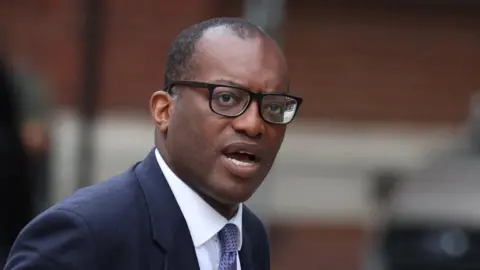Kwasi Kwarteng faces U-turn on tax or spending cuts

 Reuters
ReutersIn the market turmoil on Monday, a highly consequential move was missed.
In the Bank of England's statement seeking to reassure investors, it welcomed "the role of the Office for Budget Responsibility (OBR) in its assessment of prospects for the economy and public finances".
The OBR provides independent forecasts of the impact of government's plans on the economy. My understanding is that the Bank - at the very least - made a forceful suggestion to the Treasury that it needed to embrace the OBR as a means of earning back lost credibility with the financial markets.
Turning down the OBR's offer of an immediate forecast to accompany Friday's budgetary announcements, as I revealed last week, definitely made the market reaction worse.
As one investor told me, Chancellor Kwasi Kwarteng appeared to present a collection of think tank pamphlets at Friday's mini-budget, whereas the markets were wondering why, at a time of general financial instability, there were no borrowing numbers presented with it.
A draft of the OBR's forecast was waiting on the new chancellor's desk when he arrived at the Treasury.
It could have been updated with new measures made to legal forecasting standards well before last Friday. Indeed the Treasury costed all the new measures itself.
There was a concern in government that the OBR would say awkward things about costings, or making the numbers add up, or the extent of borrowing or spending cuts required.
Above all, the OBR would give an instant assessment as to whether the government's plan worked in its central purpose - to raise the long-term growth rate of the economy.
That is now in the past. But the consequences of this are profound for the next few fragile weeks ahead.
Despite the market reaction, Mr Kwarteng said on Tuesday that the government is "confident in our long-term strategy to drive economic growth through tax cuts" and "supply side reform " that is, through cutting taxes, deregulation and free trade.
"Cabinet ministers will set out more supply side measures over coming weeks to make meaningful change," he said. "Right across government, departments have to be focussed on this. As I said on Friday, every department will be a growth department."
He said the medium-term fiscal plan in November will come alongside an OBR forecast.
"That will be a credible plan to get debt to GDP falling," he said. "I'm confident... our approach will work."
U-turn ahead
All the costings for the tax cuts revealed by the chancellor in the mini-budget will now be refined - and very possibly changed.
The borrowing numbers will be calculated and revealed.
The even higher costs the government now faces to borrow money - taking up even more of the UK budget - will have to be factored in. And all that will have to add up within eight weeks when Mr Kwarteng sets out his medium-term fiscal plan on 23 November.
It is difficult to see how this will work while sticking to current plans.
Either some of the tax cuts will be rolled back, slowed down or U-turned on entirely, or expect massive spending cuts. The spending cuts would have to be of a size that will be politically fraught at a febrile time.
And yet the Treasury said in a statement on Monday that the existing Spending Review totals set until 2024-25 will be adhered to.
Something will have to give.
To earn back lost market credibility, the government will now have to show its workings and eventually will adjust policy in one of these unpalatable ways.
And in the intervening weeks the markets will continue to test the government at every turn.
Every single speech made by the Cabinet, especially at the next week's Conservative Party Conference, will be combed through. Perhaps there was a plan to announce further tax cuts at Conservative conference? Brave.
The Bank of England in deciding how much to hike interest rates in November, before Mr Kwarteng does his big reveal, will use the OBR's early workings.
So if the government seeks to avoid unpalatable choices, allowing borrowing to balloon, that will be met with even higher rises in interest rates.
On the fundamental aim of this administration - the plan to raise long-term growth - the OBR will have the immediate judgement.
Could the government possibly present a plan that its own forecasters say does not increase growth? Remember that the last adjustment the OBR made to trend growth was to include the impact of a decline in investment, Brexit trade barriers with Europe, and a declining workforce. Long-term growth is now predicted at just 1.4% versus 2.2% four years ago.
This is also why the government promised to give more detail on "pro growth" policies ranging from immigration to planning and childcare.
The OBR will not decide or dictate policy. But the consequences of its central role, insisted upon by the Bank of England, changes everything.
